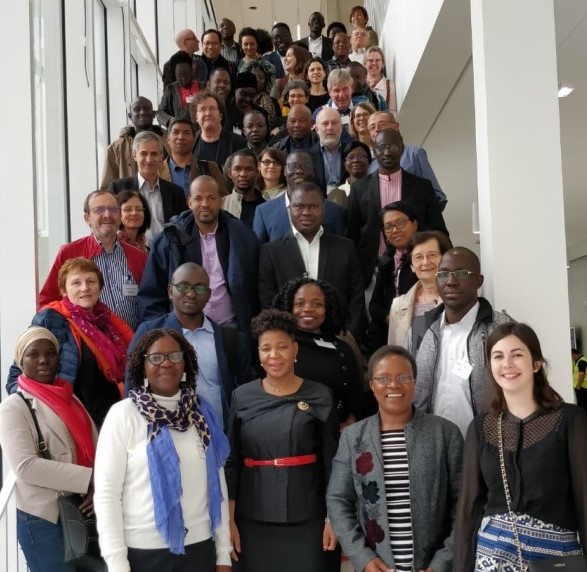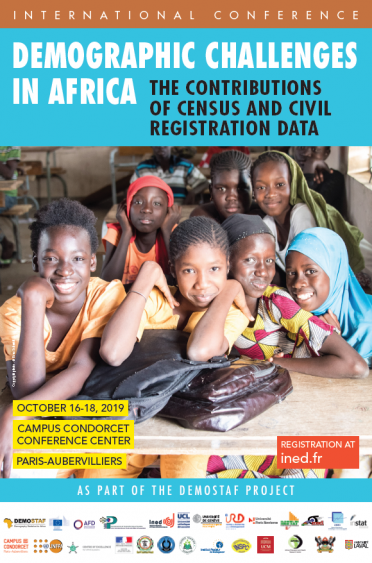Demographic Challenges in Africa:
The Contributions of Census and Civil Registration DataCampus Condorcet, Paris-Aubervilliers, 16-18 October 2019 This conference was organized as part of the European project DEMOSTAF, in partnership with the French Institute for Demographic Studies (INED), the French Agency for Development (AFD), Campus Condorcet, the IUSSP ‘CRVS’ Panel, the United Nations Population Fund (UNFPA), the Centre of Excellence for Civil Registration and Vital Statistics Systems housed at Canada’s International Development Research Center (IDRC) and the French Ministry of Europe and Foreign Affairs (MEAE). 
The Sustainable Development Goals (SDGs) set in 2015 for the year 2030 present a significant challenge to the African continent, home to many of the world’s least developed countries. With the world’s fastest population growth, Africa is in the midst of unprecedented transitions but country-by-country situations diverge markedly. However, current demographic data and trends in Africa are not precise. Data production, consistency, and reliability vary widely from one country to the next. Civil registration and vital statistics (CRVS) are not easily exploitable in most countries. While some African national statistical offices (NSO) conduct routine censuses and surveys to inform planning, in other countries NSOs struggle to generate accurate data. Existing statistical sources are underused and insufficiently analyzed because of data quality issues as well as a lack of time and resources. The special emphasis placed in the SDGs on inequality and ensuring inclusive developmental progress calls for the production of indicators at the most narrowly defined geographical and socio-economic level. This need demands stronger interaction between government statisticians and researchers. For example, census data, although spaced out over time, provide demographic and socio-economic information at the individual and household levels across a country’s entire population. Census data enable the production of indicators at highly disaggregated levels, as well as mapping, environmental, and multilevel analyses. Meanwhile, the systematic recording of vital events in civil registration systems is still rare on the continent. However, longstanding and efficient systems are in place at the local level. Efforts are also being made to improve record-keeping by introducing collection systems and methods more relevant in their contexts. This conference aimed to shed light on current research into sociodemographic dynamics in Africa by drawing on official statistics, in particular censuses and CRVS. This requires examining populations’ characteristics and the ways in which they are evolving in terms of fertility and reproductive health, family and marriage, migration, education, health and mortality in a variety of countries across the African continent by reframing them in their environmental, social and economic contexts. Most of the sessions in this three-day conference focused on the value of census data and aimed to highlight the considerable potential of this type of data to understand demographic dynamics: quality of the data and estimates, confrontation of sources, international comparability and comparisons, geographic analysis and territorial dynamics... One of these sessions was organized by UNFPA on the opportunities for georeferencing census data. Two sessions were devoted to civil registration and vital statistics: the first one on the determinants of death and birth registration in different contexts; the second on initiatives and projects promoting registration coverage. (read detailed article on the CRVS sessions here) This conference was also an opportunity to reflect on how to enhance the exploitation of the data produced, to carry out collaborative research associating the producers of official statistics from the analysis to the presentation and dissemination of the results. The closing session of the conference featured a round table on the obstacles and the opportunities for official statistics to respond to demographic challenges. The conference brought together 80 participants, junior and senior researchers and statisticians from 17 different countries. Twenty-six papers were presented and discussed in the scientific sessions and 13 posters were presented as flash presentations, bringing the total number of projects and results presented to about 40. See also:
Organizing Commmittee: Géraldine Duthé (INED, France), Valérie Golaz (INED, France), Jean-Alain Goudiaby (Université de Ziguinchor, Sénégal), Gilles Pison (INED/Muséum national d’histoire naturelle, France), Thomas Wiest (INED, France).
Scientific Committee: Bazongo Baguinébié (INSD, Burkina Faso), Moussa Bougma (ISSP, Burkina Faso), Aurélien Dasré (Université Paris Nanterre, France), Valérie Delaunay (IRD, France), Binta Dieme (ANSD, Senegal), Irina Dincu (IDRC, Canada), Géraldine Duthé (INED, France), Assa Dioumba Gakou (INSTAT Mali), Valérie Golaz (INED, France), Jean-Alain Goudiaby (Université de Ziguinchor, Senegal), Sabrina Juran (UNFPA), Christian Kakuba (Université Makerere, Uganda), Richard Marcoux (Université Laval, Canada), Bruno Masquelier (Université Catholique de Louvain, Belgium), Laure Moguérou (Université Paris Nanterre, France), Marc Pilon (IRD, France), Gilles Pison (INED/ Muséum national d’histoire naturelle, France), Cécilia Poggi (AFD, France), Arsène Ravelo (INSTAT, Madagascar), Clémentine Rossier (Université de Genève, Switzerland), Claudine Sauvain Dugerdil (Université de Genève, Switzerland), Romesh Silva (UNFPA), Abdramane Bassiahi Soura (ISSP, Burkina Faso), Madeleine Wayack Pambè (ISSP, Burkina Faso). 
 |